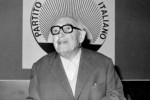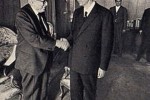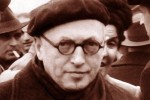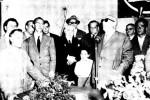2020 (EN)
|
01 January 2020
Tutte le Attività (EN) -
Anno 2020
 On the first day of the year 2020, the events concerning the most significant anniversaries that see the Fondazione Mediterraneo and the Museum of Peace begin.
On the first day of the year 2020, the events concerning the most significant anniversaries that see the Fondazione Mediterraneo and the Museum of Peace begin.
The first is dedicated to the fortieth anniversary of the death of Pietro Nenni.
Many visitors and socialist comrades intervened in the multimedia rooms of the Museum where - in the section "The great protagonists of history" - videos, images and documents of the great socialist are available.
President Capasso, moved, remembered the many meetings with Pietro Nenni in Formia and in Rome: starting from the first, in 1959, when the then secretary of the PSI inaugurated the section of San Sebastiano al Vesuvio and embraced his "Raffaele" , mayor and socialist who honored the party and Italy.
In that photo, at the age of 6, President Capasso appears alongside his father Raffaele and Pietro Nenni.
In all the turning points and policies of the Socialist Party, from 1922 to 1969, there is its mark. History of a leader with few equals in the history of this country: socialist, Jacobin and statesman. Rarely has a party identified itself as its leader, as happened to the PSI with Pietro Nenni. In all the turning points and policies of the Socialist Party, from 1922 to 1969, there is its mark. And today, January 1, 2020, the fortieth anniversary of his death, which took place on the night between December 31, 1979 and January 1, 1980, falls, the politician who most wanted and fought for the Republic.
Born in Faenza on 9 February 1891 in a poor family, he is five years old when he loses his father. Little Nenni grows up between the impatience towards the strict rules of the orphanage and the desire to dive into the social battles that upset Italy at the beginning of the 20th century. He is only nine years old when, immediately after the mortal attack on King Umberto I by the anarchist Gaetano Bresci, he writes on the walls of the orphanage: "Viva Bresci".
His republican militancy begins that day. As soon as he was of age, he organized strikes in his homeland and was repeatedly convicted of his vitriolic articles and fiery speeches against the monarchy. During a 'stay' in Forlì prison he met Benito Mussolini, both had been arrested for a demonstration against the war in Libya. So the future Duce is one of the most influential socialists, revolutionaries and maximalists in the country.
The Great War is the first watershed of his life. When the cannons begin to fire, Nenni is still a republican, but when the war is over he approaches the Socialist Party. Many look at him with suspicion, but Serrati, the leader of the maximalist current, opens the doors of the Avanti to him! and the party.
Ironically, Nenni waged the first major political battle in the party against Serrati. The latter, after expelling the reformists from Turati, intends to merge the PSI with the PCI to be accepted into the Communist International. Nenni is not there and accuses him of wanting to liquidate the party. In 1923 the XX Congress was held and the two lines collided. Vince Nenni and the autonomy of the PSI is safe.
Three years later he founded the Fourth State, a clandestine socialist newspaper, together with Carlo Rosselli. A few months later, however, the issuing of the Fascist Laws forced him to leave Italy and repair in France. A long exile that lasts almost 20 years begins. Nenni never gets used to the life of the exile and continues to publish the Avanti! in Paris and Zurich. In 1930 he was the main protagonist of the newfound unity between reformists and maximalists and in 1934 he was in the front row for the signing of the Pact of unity of action with the PCI.
When at the outbreak of the Second World War France fell and was invaded by Nazi troops, Nenni settled in the Pyrenees, near the border with Spain. Print "The New Forward!" and distributes it clandestinely. "It is not only the conscience of duty that makes me do it, but the shame that I would have of myself standing idle," he writes in his diary. He has no intention of escaping, but intends to continue the struggle: "There are in life - he explains - testimonies to be made, which cannot be avoided".
On the eve of his 52nd birthday he is arrested by the Gestapo. He should be deported or shot, and instead, after a spasmodic month of waiting in prison, he is sent to Italy and sent to confinement in Ponza. Was it his old friend Mussolini who saved him from a sure death? Maybe, but there are no documents to ascertain it.
As soon as the Anglo-Americans land in Sicily, he returns free and dedicates himself to the reorganization of the socialist party, of which he is appointed secretary. After the war he is shocked by tragic news: his daughter Vittoria died about a year earlier in Auschwitz. Nenni is destroyed by pain but continues his battle for the republic and socialism with a decision extraneous to all the other political leaders, so much so that Francesco Saverio Nitti says of him: "In Italy there is only one revolutionary: Nenni. Fortunately there is Togliatti to moderate it. "
In the elections of 1946 for the Constituent Assembly, the socialist party obtained 20.7% of the votes, while the PCI obtained 18.9%. Only the DC is stronger with 35.2%. Nenni's unambiguous choice for the Republic, which triumphs over the monarchy, has rewarded. The following year, however, the problems begin. The disagreement on the alliance with the PCI will lead the Saragat reformist minority to leave the party and give life to the PSLI (later PSDI).
Nenni, faced with the serious hemorrhage of leading cadres, thinks of remedying it by creating unique lists with the Communists, but it is a disaster. At the policies of 1948 the alliance, renamed the Popular Front, obtained 31% of the votes, but out of 183 elected deputies only 45 are socialists. It was the beginning of an ideological subjection of Italian socialism to communism, which lasted until 1956. That year, after Khrushchev denounced Stalin's crimes and that Soviet tanks put down the Budapest revolt in blood, Nenni decided to break the alliance with the PCI and condemns the Moscow intervention.
The alliance with the DC and the "center-left" in the early 1960s was a "painful necessity" for Nenni. The leader of the PSI cultivates the idea of a splendid isolation of the PSI to be credited as a valid government alternative, but the facts do not allow him to maintain this tactic for a long time. The Tamburini government and the constant threats of an authoritarian turn in the country force Nenni to make a choice: either to risk losing democracy or to ferry the Socialists into the "button room". And between the two roads Nenni chooses the second.
A few years later he is still the protagonist, together with Saragat, of the merger of Psi and Psdi in the Psu. However, the experiment proved to be a failure, even at the electoral level, and after just two years the two parties split again. "I did it all wrong," he said a few days before he died on New Year's Eve. In reality, at least the battle for the Republic managed to win it and it was no small thing.









